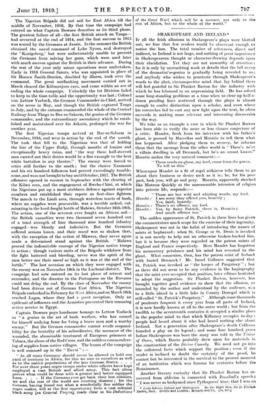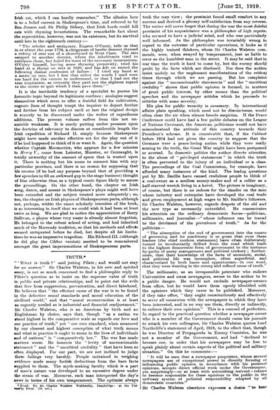SHAKESPEARE AND IRELAND *
IF all the Irish allusions in Shakespeare's plays were blotted out, we fear that few readers would be observant enough to notice the loss. The total number of references, direct and indirect, to Ireland is not large, and nothing of great importance in Shakespearean thought or character-drawing depends upon their elucidation. Yet they are not unworthy of attention ; for it is only by unremitting work at details that the full sweep of the dramatist's genius is gradually being revealed to us ; and anybody who wishes to penetrate through Shakespeare's words to the alert, circumspective mind that lay behind them will feel grateful to Sir Plunket Barton for the industry with which he has laboured in an unpromising field. He has solved some long-standing problems at a time when to clear up half-a- dozen puzzling lines scattered through the plays is almost enough to confer distinction upon a scholar, and even where his researches fail to cast any new light upon the text, he often succeeds in making some relevant and interesting discoveries by the way.
We take as an example a case in which Sir Plunket Barton has been able to verify the more or less chance conjecture of a critic. Hamlet, fresh front his interview with his father's ghost, is pressed by Marcellus and Horatio to tell them what has happened. After pledging them to secrecy, he informs them that the message from the other world is There's ne'er a villain dwelling in all Denmark, but he's an arrant knave." Horatio makes the very natural comment:—
"There needs no ghost, my lord, come from the grove, To tell us this."
Whereupon Hamlet in a fit of regal sulkiness tells them to go about their business or desire such as it is ; he, for his poor part, look you, will go and pray. Horatio, apparently shocked like Mistress Quickly at the unseasonable intrusion of religion into private life, responds :- "These are but wild and whirling words, my lord.
Hamlet : I am sorry they offend you, heartily ;
Yes, faith, heartily.
Horatio : There's no offence, my lord. Hamlet : Yes, by Saint Patrick, there is, Horatio ;
And much offence too."
The sudden appearance of St. Patrick in these lines has given the commentators much scope for the exercise of their ingenuity. Shakespeare was not in the habit of introducing the names of saints at haphazard : when St. George or St. Denis is invoked it is not merely to help out an otherwise broken-backed line, but it is because they were regarded as the patron saints of England and France respectively. Here Hamlet has forgotten his momentary petulance and his mind has reverted to the ghost. What connexion, then, has the patron saint of Ireland with buried Denmark ? Mr. Israel Gollancz suggested that St. Patrick was invoked as " the keeper of Purgatory " ; but as there did not seem to be any evidence in the hagiography that the saint ever occupied that position, later editors hesitated to adopt the suggestion. Sir Plunket Barton, however, has brought together good evidence to show that the allusion, as intended by the author and understood by the audience, wca to a little island in a little lake in County Donegal which is still called " St. Patrick's Purgatory." Although some thousands of penitents frequent it every year from all parts of Ireland, it is now hardly known at all to the outer world ; but from the twelfth to the seventeenth centuries it occupied a similar place in the popular mind to that which Killarney occupies to-day : people had heard about it who had heard nothing else about Ireland. Not a generation after Shakespeare's death Calderon founded a play on its legend ; and some four hundred years before Shakespeare was born the story was told in the Vision of Owen, which Dante probably drew upon for materials in the construction of the Divine Comedy. We need not go into the collateral facts which support the position ; even if the reader is inclined to doubt the certainty of the proof, ho cannot but be interested in the survival to the present moment of an institution which was famous for centuries before the
Renaissance.
Another literary curiosity that Sir Plunket Barton has re- covered from oblivion is connected with Rosalind's speech : " I was never so berhymed since Pythagoras' time, that I was an
• Links between Ireland and Shakespeare. By the Right lion. Sir D. Plunktot Barton, Bart. Dublin and London : ]ittuatel sad Co. Its. net.1
Irish rat, which I can hardly remember." The allusion here is to a belief current in Shakespeare's time, and referred to by Ben Jonson and Sir Philip Sidney, that Irish bards could kill rats with rhyming incantations. The remarkable fact about the superstition, however, was not its existence, but its survival
until late in the eighteenth century:— "The scholar and antiquary, Eugene O'Curry, tells us that in or about the year 1778, a clergyman of herdic descent rhymed a colony of rats out of a churchyard in West Clare. The rats escaped to another district, where the inhabitants tried to extirpate them, but failed for want of the necessary incantations. O'Curry himself, having some rhyming propensity, tried his band at a rhyme on rats in 1820, and has left on record the following dismal confession of failure : I tried my hand at a satire on rats, but I fear that either the words I used were too hard for the vermin to understand, or that I had not the true inspiration, as certainly they paid not the slightest regard to the notice to quit which I then gave them.' "
It is the inevitable tendency of a specialist to pursue his favourite topic beyond its legitimate confines ; analogies suggest themselves which seem to offer a fruitful field for cultivation, cognate lines of thought tempt the inquirer to depart further and further from his subject until at last the original design Is scarcely to be discovered under the welter of superfluous additions. The present volume suffers from this not un- amiable weakness. It is surely putting undue pressure upon
the doctrine of relevancy to discuss at considerable length the Irish expedition of Richard II. simply because Shakespeare might have made another effective act for the play out of it if he had happened to think of it or want it. Again, the question whether Captain Macmorrice, who appears for a few minutes in Henry V., came from Leinster, Munster, or Connaught, is
totally unworthy of the amount of apace that is wasted upon it. There is nothing but his name to connect him with any
particular province, and there is no reason for supposing that his creator (if he had any purpose beyond that of providing a few speeches to fill an awkward gap in the stage business) thought of him otherwise than as a typical comic figure likely to amuse the groundlings. On the other hand, the chapter on Irish song, dance, and accent in Shakespeare's plays might well have been extended and the subject treated more adequately ; so, too, the chapter on Irish players of Shakespearean parts, although not, perhaps, within the exact scholarly intention of the book, is so interesting in itself that we could wish it had been at least twice as long. We are glad to notice the appreciation of Barry Sullivan, a player whose very name is already almost forgotten. He belonged to the robust school of acting, and had inherited much of the Macready tradition, so that his methods and effects seemed antiquated before he died, but despite all his limita- tions he was an impressive tragedian. His Richard III. (although he did play the Cibber version) merited to be remembered amongst the great impersonations of Shakespearean parts.







































 Previous page
Previous page